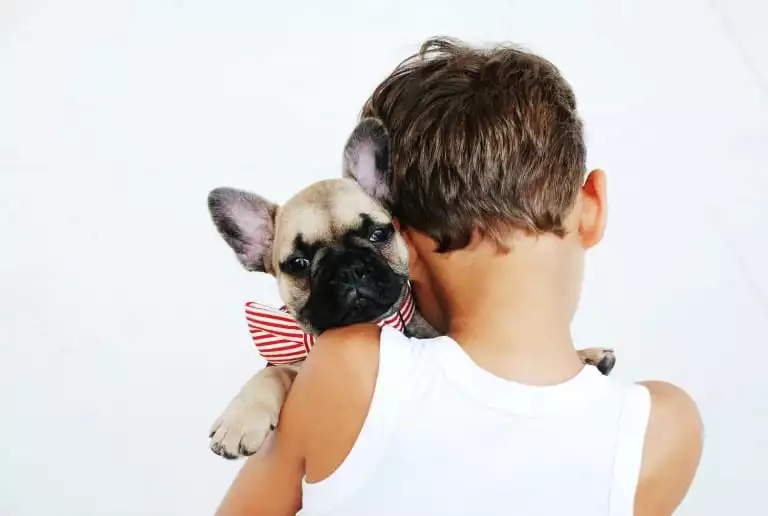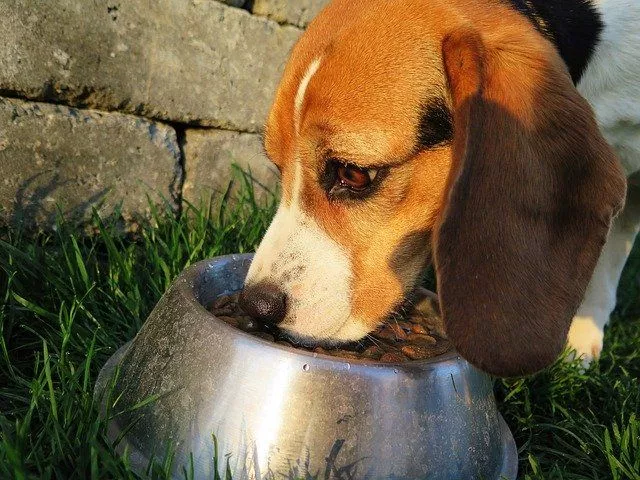We all know that having a dog affected by high levels of stress and anxiety is heartbreaking. As pet owners we will keep trying to understand why our dog is anxious and try to remedy the situation. Many cases of anxiety in dogs can be helped by removing what is causing the stress or by training and conditioning your dog to become desensitised to it.
However, there are cases of canine anxiety that will need your veterinarian’s help. Some dog owners will opt for prescription medication for their dog’s anxiety, though in less severe cases, a change in diet and activity could work wonders. Here are tips for a healthier diet for your anxious dog.
Understanding Anxiety in Dogs

Before thinking about treatment for your dog with anxiety, it is important to try to understand a bit more about canine anxiety. So, let us try to understand where anxiety in dogs comes from, what the symptoms are, how a veterinarian can treat it and if there are any natural ways to help it. The term canine anxiety is used to describe a dog’s feeling of anticipation of future danger, and whether that danger actually exists or not. Your dog might live in a safe home and should not be anxious, but dog psychology is complicated. Even a healthy dog with a wonderful owner might experience anxiety for various reasons.
How to spot dog anxiety
Let us start by discussing how to spot anxiety in dogs. What are the signs and symptoms of an anxious and nervous dog? First of all, dogs that are feeling anxious might act out and show signs of canine anxiety even within their own home. Signs that your dog can be anxious are;
- Shaking
- Panting
- Flattened ears
- Tail tucked between the hind legs
- Cowering/hiding
- Urinate involuntarily
- Lip licking
- Yawning
- Raised hair on the back of the neck
- Avoiding eye contact/averting the eyes
- Scratching self frequently (when he was not previously itchy)
So, when you see some of these signs of canine anxiety, you should firstly book a check-up with your dog’s vet. In this way you can make sure that your dog is not acting anxious because of some underlying illness. Keep in mind that dogs with internal organ dysfunction, electrolyte disturbances or similar problems can also show nervous behaviour. Once you have ruled out that your dog does not have a medical problem, then it is time to understand the source of your dog’s anxiety.
Separation Anxiety

Dogs with separation anxiety will usually also act out when left alone or unattended for long periods of time. They can turn your house into a wreck if they have separation anxiety. They usually chew at things such as rugs, cushions and shoes and can scratch and gnaw at furniture or doors, to name a few things.
This is usually because a dog is bored, but it can be also because your dog is worried and anxious.
Noise Phobias
Noise Phobias are another type of anxiety that dogs might have. Such noise anxiety is not uncommon in dogs, and can be triggered by loud noises such as thunderstorms or vacuum cleaners. There could be loud sounds from construction or seasonal festival fireworks happening close by. There can also be specific sounds, that the dog might associate with a fearful memory. Noise phobia is easy to identify, as the dog will show the signs of anxiety only when it encounters or anticipates the noise it’s afraid of. The dog may cower, shake, hide, or stay very close to its owner. In very severe cases, the dog may self-mutilate or destroy things.
Social Anxiety
Finally, the third type of canine anxiety is social anxiety. A socially anxious dog will either be timid or even aggressive when faced with a social situation that it is not used to and makes it uncomfortable. This usually stems from dogs that are not socialised well, or dogs that have been through a traumatic experience when surrounded by people or other animals. This problem usually solves itself with proper socialisation.
Treating Canine Anxiety

You can help many anxieties and phobias through training and conditioning. If your dog suffers from separation anxiety you should supply more exercise and mental stimulation to make it more tired and satisfied when left alone. Training your dog will also help you build a stronger bond with your dog so it will feel more secure when left alone. For dogs with noise phobias, the owner can try to remove the problematic noise completely or try to condition their dog to stop worrying about the sounds with desensitisation methods. A dog with social anxiety can be socialised more to get him desensitised of the stressful situation.
Of course, some phobias can be very difficult to reduce and control with just training and conditioning. In this case, your veterinarian can recommend medication if beneficial. On the other hand, you can also try to alter your dog’s diet to a healthier alternative that helps anxious dogs. Yes, there are types of dog anxiety which a tailored adequate diet can help with. This theory is supported by various studies in dog’s nutrition to reduce anxiety in dogs.
Dog Food for Anxiety – Change Diet First

Holistic treatments that involve a change in your dog’s nutritional diet can be your first line of defence against your dog’s anxiety. In fact, there are several studies that try to find healthier diet alternatives and supplements that can be added into your dog’s food for a less anxious dog. Such natural and healthier diet remedies for anxious dogs will have fewer side effects and less of an impact on the dog’s personality.
One particular journal article reports on the effects of a dog’s diet when supplemented with L-tryptophan and alpha-casozepine. The study shows that L-tryptophan is the amino acid that gives you a relaxed feeling, while alpha-casozepine is a component of milk with activity similar to that of Valium and related drugs. Here is how you can change your dog’s diet for a healthier and less anxious dog.
Reduce Protein
Reducing protein in your dog’s diet can be one potential way to reduce anxiety. For anxiety induced aggressive dogs, reducing protein intake will have an effect on their serotonin production, which has a calming effect. There is also alpha casozephine, a protein in mother’s milk that has a sedative effect. You can buy this supplement and add it to your dog’s diet to help with anxiety.
Boost Vitamins
Vitamin deficiency can also lead to psychological imbalance in dogs. A lack of vitamin A might make your dog physically and mentally tired or anxious. Vitamin E keeps a dog’s cognitive abilities in shape, and can potentially prevent anxiety as well. Lastly, a good supply of vitamin B1, B6, and B12, is also very important to keep your dog’s mentally balance.
Specialized food
Thankfully there are dog food manufacturers that specifically design diets to help an anxious dog be healthier and reduce anxiety. One of the leading brands of dog food available for stressed and anxious dogs is the Royal Canin’s Veterinary Diet Calm. This contains hydrolyzed milk protein and tryptophan, which are sure to make your dog calm and happy. There are several other medicated dog brands that your dog’s vet might recommend.
Naturally Calming Foods for Dogs
On another note, it is always great if you can help your anxious dog with more natural and healthier ingredients in its diet. In fact, you can find natural healthier foods and diet supplements that can help an anxious dog combat and prevent anxiety. So, which natural foods help reduce dog anxiety? Below is a list I hope you find useful!
Blueberries
A dog’s diet supplemented with fresh blueberries can be a great way to provide your dog with additional vitamins, minerals and antioxidants, which can help protect your dog from the effects of stress. Wild blueberries contain valuable polyphenols. So, simply add a few blueberries to your dog’s food serving, or mix them with some goat milk yogurt.
Kale
Leafy greens like kale, as well as Swiss chard and spinach, are packed with nutrients. These include vitamins A, B6, C and K, along with calcium, manganese, copper, potassium and iron. Kale is also a great source of fiber, antioxidants, phytonutrients and carotenoids. Isothiocyanates made from the glucosinolates in kale play an important role in these preventive, stress-protective qualities.
Sweet Potatoes
Sweet potatoes are one of the world’s healthiest foods. They contain antioxidants and are a terrific source of vitamin E. Sweet potatoes also contain many other important nutrients, including vitamins A, B6 and C, calcium, iron, folate, potassium, copper, thiamine and iron. The potassium in sweet potatoes helps maintain fluid and electrolyte balance, which is good news for reducing anxiety.
Beef
Beef is a natural antidepressant. It contains B vitamins that can regulate stress levels. Beef is very rich in folic acid, and also contains pantothenic acid, also known as vitamin B5, which is great for anxiety. This vitamin enables the production of anti-stress hormones in the adrenal gland that controls the release of cortisol. Beef liver is a great source of pantothenic acid that reduces blood cortisol and dulls the body’s response to stress.
Turkey
If your dog acts overly anxious, you may want to consider adding turkey to his diet. It is a great source of L-tryptophan, an amino acid often associated with the regulation of sleep. Tryptophan also produces what researchers call ‘œfeel good chemicals’; it is a precursor to serotonin, a neurotransmitter that helps both humans and dogs feel calm and relaxed.
Oily Fish
Research has demonstrated that consuming Omega-3 fatty acids can help suppress the production of adrenaline that leads dogs to a ‘œfight or flight’ response. Too much adrenaline can cause anxiety and even aggression in dogs. By adding Omega-3 to your dog’s diet adrenaline production can be slowed down. Omega-3 fatty acids are found in oily fish such as wild salmon, mackerel, sardines and tuna. So, try to add some of these fish with your dog’s food. You can also supply Omega-3 supplements in the form of fish oil added to your dog’s food. Salmon is extra special because it also contains L-tryptophan.
Hemp Seed Oil
Hemp is a super food that eases joint pain and inflammation, supports cardiovascular health, conditions the skin and coat, and acts as a digestive aid. Overall, it is a terrific way to support your dog’s immune system and alleviate stress through its Omega-3 content.
Whole Oats / Brown rice
Fiber rich complex carbohydrates slow down the rate of digestion and enhance the absorption of tryptophan. Whole oats or brown rice are a good source of these. A healthy level of tryptophan will help the production of serotonin, which scientists consider as nature’s very own antidepressant.
Almonds
Almonds are a great source of vitamin E, B vitamins, magnesium and zinc. Magnesium supports a healthy nervous system function and the production of ‘œhappy’ chemicals in the brain. This will make your dog become more resilient during bouts of stress because its nerves and muscles are more relaxed. Whole almonds or almond butter are a great way to supplement your dog’s diet.
Pumpkin Seeds
Giving your dog pumpkin seeds may help your dog’s anxiety problem. Pumpkin seeds contain L-tryptophan and glutamate, which are required in the synthesis of GABA, an anti-stress neurochemical. They are also a good source of vitamin E, and selenium, an antioxidant that helps support the immune system. Studies show that a deficiency in selenium can increase anxiety, depression and fatigue.
In conclusion
Diet alone might not cure dogs of their anxiety. However, many dog nutrition experts believe that a healthier diet can be used as part of a comprehensive therapeutic plan for anxious dogs. Changing your dog’s diet to a healthier one may help your anxious dog along with consistent training and conditioning techniques. So, talk to your veterinarian and consider adding nutritional food that may help reduce and prevent anxiety in dogs. A healthier diet will surely help your anxious dog!





